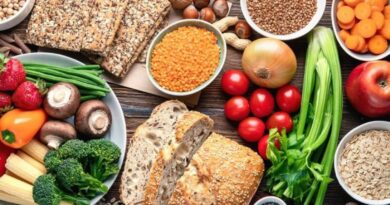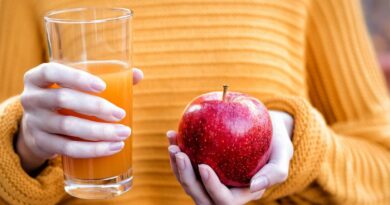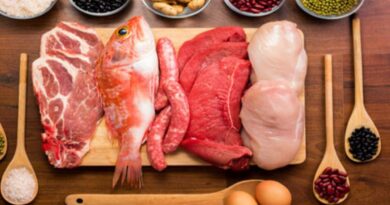How Much Protein in Banana
Bananas are a nutritious fruit that is often consumed as part of a healthy diet. They are an excellent source of dietary potassium, vitamin C, dietary fiber and vitamin B6. One medium-sized banana contains about 110 calories and 30 grams of carbohydrate.
Additionally, bananas contain small amounts of protein, fat, and minerals such as magnesium and zinc.
While the exact amount of protein in bananas may vary depending on the size and variety, most bananas contain around 1-2 grams of protein per average sized fruit. This means that eating one or two bananas as part of a balanced diet will not contribute a significant amount of protein to your daily intake.
However, if you are looking for foods that are higher in protein content, there are many other options available including lean meats, poultry, fish, tofu, legumes, nuts and seeds.
Bananas are a great source of dietary potassium, vitamin C, dietary fiber and vitamin B6. They also contain small amounts of protein, magnesium, manganese and copper. All of these essential nutrients work together to keep our bodies functioning properly.
Bananas are often thought of as being a “carbie” fruit because they do contain a fair amount of sugar. However, they are actually a low-glycemic food, which means they don’t cause spikes in blood sugar levels. This makes them a great choice for people who are watching their weight or managing diabetes.
While the sugar content in bananas is not overly high, the actual amount of protein in banana is quite low. One medium banana contains about 3 grams of protein. That’s less than 1 gram per ounce!
So if you’re looking for a fruit that will help you up your protein intake, bananas aren’t going to be your best bet.
How Much Protein in Apple
Did you know that an apple contains about 0.3 grams of protein? That might not seem like a lot, but it’s actually a pretty decent amount for a fruit! And, apples are a great source of dietary fiber and vitamins A and C. So, if you’re looking for a healthy snack that will give you a little bit of protein, reach for an apple!
1 Banana Calories And Protein
Bananas are a popular fruit that are often eaten as a snack. They are relatively low in calories and fat, and contain a good amount of dietary fiber and potassium. One medium-sized banana contains about 105 calories and 1.3 grams of protein.
Bananas are also a good source of several vitamins and minerals, including vitamin C, vitamin B6, manganese, and magnesium. The skin of the banana also contains a substance called lutein, which is important for eye health.
Despite their nutritional benefits, bananas should be consumed in moderation as they are high in sugar content.
One medium-sized banana contains about 14 grams of sugar.
Fat in Banana
Most people think of bananas as being a healthy food, and for the most part they are. However, it is important to be aware that bananas do contain fat. One medium banana contains about 3 grams of fat, which is not a lot compared to other fruits.
However, if you are trying to lose weight or watch your fat intake, you may want to avoid eating too many bananas.
The type of fat found in bananas is mostly saturated and monounsaturated fats. These types of fats are not as bad for you as trans fats or highly processed oils, but they can still contribute to weight gain if you eat too much of them.
If you are looking for a low-fat alternative to banana, try another fruit such as strawberries or apples.
2 Banana Protein
Banana protein is a popular way to add extra protein to your diet. There are many different ways to make banana protein, but the most common is to blend banana and milk together. This creates a thick, creamy shake that can be enjoyed as a snack or meal replacement.
Banana protein is high in calories and fat, so it’s important to control portions if you’re trying to lose weight. A typical banana contains about 100 calories, so two bananas in a shake would be 200 calories. That’s not including the milk, which adds another 80-100 calories.
So a banana protein shake could easily be 300+ calories.
If you’re looking for a high-protein snack or meal replacement that’s also low in calories, there are better options out there than banana protein. But if you enjoy the taste of bananas and don’t mind the extra calories, then go ahead and give it a try!
How Many Carbs in a Banana
Most people are aware that bananas are a healthy fruit option, but many don’t realize just how many nutrients they pack. One medium banana has around 27 grams of carbs, which is a good amount for a fruit. Bananas also have fiber, vitamins, and minerals.
They’re especially high in potassium, which is important for maintaining blood pressure and heart health.
While 27 grams of carbs may seem like a lot, it’s important to remember that most of those are natural sugars and fiber. This means that the body breaks them down slowly, providing long-lasting energy instead of the spikes and crashes associated with refined sugars.
Bananas are a great snack option for people who are looking for sustained energy throughout the day.
Banana Benefits
Bananas are one of the most popular fruits in the world and for good reason. They are packed with nutrients and offer a variety of health benefits.
Here are some of the top banana benefits:
1. Bananas Are Nutrient-Rich
Bananas are a good source of several vitamins and minerals, including vitamin C, potassium, magnesium, copper, and manganese (1).
One medium-sized banana contains about 110 calories and is made up of mostly water and carbs.
This fruit is also low in fat and protein (2). Despite their small size, bananas pack a powerful nutritional punch.
2. Bananas May Help You Lose Weight
Eating bananas as part of a healthy diet may help you lose weight. That’s because they contain fiber, which can help keep you feeling full longer (3). What’s more, one study found that women who ate a banana twice daily as part of a 1,400-calorie diet lost 50% more weight over four weeks than those who didn’t eat bananas (4).
These results suggest that adding bananas to your diet may be an effective way to lose weight naturally. However, more research is needed on this topic before strong conclusions can be drawn. 3. Bananas May Improve Digestion Fiber has numerous gut health benefits , including regularity and digestion .
One large banana contains about 3 grams of fiber , making it a good choice for improving digestive health ( 5 ). 6 ). What’s more, animal studies have shown that resistant starch may increase feelings of fullness after meals 7 ).
2 Banana Calories
Bananas are a great source of dietary potassium, vitamin C, dietary fiber and vitamin B6. They can also help you regulate blood sugar levels. But how many calories are in a banana?
A medium-sized banana contains about 105 calories. The majority of these calories come from carbohydrates (about 75%). Bananas also contain a small amount of protein and fat.
One way to enjoy bananas without going over your daily calorie needs is to pair them with other foods that are lower in calories. For example, try adding a sliced banana to your morning oats or oatmeal instead of using higher calorie toppings like honey or syrup. You could also add a sliced banana to your lunchtime salad or wrap.
Banana Calories 100G
Assuming you would like a blog post discussing the calorie content of bananas:
Bananas are a great source of dietary potassium and vitamin C, as well as fiber. One small banana has only about 105 calories, making it the perfect snack for people watching their weight.
A medium sized banana has around 120 calories, while a large banana has approximately 135 calories. Bananas are also fat-free and cholesterol-free. So not only are they good for your waistline, they’re good for your heart too!
If you’re looking for a nutritious snack that will give you sustained energy throughout the day, reach for a banana instead of sugary snacks or processed foods. Your body will thank you!
Is Banana a High Protein Food?
Most people think of bananas as a high carbohydrate food, but they are actually a good source of protein. One medium banana contains about 3 grams of protein, which is about 10% of the daily recommended intake for adults. Bananas are also a good source of fiber and vitamins, making them a nutritious snack or addition to any meal.
While bananas are a healthy food choice, they are not necessarily a high protein food. If you’re looking for foods that are higher in protein, you can try adding nuts or nut butter to your banana, or including other high protein foods like eggs or yogurt in your breakfast or smoothie.
Which Fruit Has the Most Protein?
There are many fruits that have a high protein content, but the one with the most protein is actually a member of the vegetable family – the pumpkin. A single cup of cooked, mashed pumpkin contains around 7 grams of protein, which is more than double the amount found in a cup of strawberries or raspberries. Other fruits with a high protein content include guava, papaya, and figs.
What Foods is Highest in Protein?
Proteins are essential nutrients for the human body. They are the building blocks of our muscles, skin, and organs. Proteins are made up of amino acids, which are chained together in long chains.
There are 20 different amino acids that can be used to make proteins, and our bodies can make 11 of them on their own. The other 9 must be obtained through our diet.
The best sources of protein are animal-based foods such as meat, poultry, fish, eggs, and dairy products.
These foods contain all of the essential amino acids that our bodies need. Plant-based sources of protein such as grains, beans, nuts, and seeds also contain some essential amino acids but not all of them. This is why it’s important for vegetarians and vegans to eat a variety of plant-based protein sources to get all the essential amino acids their bodies need.
Here is a list of 12 high-protein foods that you can add to your diet:
1) Meat – Beef, pork, lamb, etc.
2) Poultry – Chicken, turkey, duck
3) Fish – Salmon, tuna , trout , etc .
4) Eggs – One large egg contains about 6 grams of protein
5) Dairy – Milk , yogurt , cheese , etc .
6) Beans – Black beans , kidney beans , lentils , etc .
Does 1 Banana Have Any Protein?
Bananas are a good source of dietary potassium, vitamin C, dietary fiber and vitamin B6. They also contain small amounts of protein, magnesium, vitamin A, iron, folate and copper. One large banana (approximately 136 grams) contains approximately 3 grams of protein.
Conclusion
If you’re wondering how much protein is in a banana, the answer is about 3 grams. That’s not a lot, but it’s also not nothing. And when you consider that bananas are a good source of other nutrients like potassium and fiber, it’s easy to see why they’re such a popular fruit.




